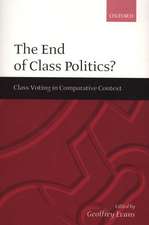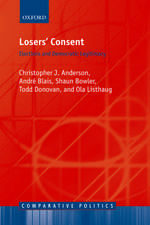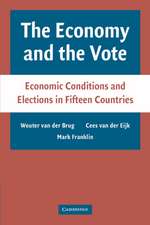Institutional Design and Voting Power in the European Union
Autor Karol Zyczkowski Editat de Marek A. Cichockien Limba Engleză Hardback – 28 oct 2010
Preț: 769.72 lei
Preț vechi: 1106.03 lei
-30% Nou
Puncte Express: 1155
Preț estimativ în valută:
147.33€ • 160.09$ • 123.84£
147.33€ • 160.09$ • 123.84£
Carte tipărită la comandă
Livrare economică 21 aprilie-05 mai
Preluare comenzi: 021 569.72.76
Specificații
ISBN-13: 9780754677543
ISBN-10: 0754677540
Pagini: 322
Dimensiuni: 156 x 234 x 27 mm
Greutate: 0.76 kg
Ediția:1
Editura: Taylor & Francis
Colecția Routledge
Locul publicării:Oxford, United Kingdom
ISBN-10: 0754677540
Pagini: 322
Dimensiuni: 156 x 234 x 27 mm
Greutate: 0.76 kg
Ediția:1
Editura: Taylor & Francis
Colecția Routledge
Locul publicării:Oxford, United Kingdom
Recenzii
'Making informed choices in politics is very important. This book offers a common sense approach towards decision making in the EU based on clear scientific reasoning. I hope that it might become of interest for decision-makers.' Jacek Saryusz-Wolski, former Polish Minister for European Affairs, Member of the European Parliament
Notă biografică
Marek A. Cichocki, Programme Director, Natolin European Centre, Institute of Applied Social Sciences, University of Warsaw, Poland and Karol Zyczkowski, Professor, Jagiellonian University, Poland
Cuprins
Introduction; I: Voting System for the Council of European Union; 1: Is the Double Majority Really Double? The Voting Rules in the Lisbon Treaty 1; 2: Penrose's Square-Root Rule and the EU Council of Ministers; 3: Jagiellonian Compromise – An Alternative Voting System for the Council of the European Union; 4: The Double Majority Voting Rule of the EU Reform Treaty as a Democratic Ideal for an Enlarging Union; 5: The Blocking Power in Voting Systems; 6: The Distribution of Power in the Council of Ministers of the European Union; II: Distribution of Power in the European Union; 7: The Distribution of Power in the European Cluster Game; 8: The Constitutional Power of Voters in the European Parliament; 9: Decision Rules and Intergovernmentalism in the European Union; 10: On the Relative Unimportance of Voting Weights; 11: Patterns of Voting in the Council of Ministers of the European Union; 12: Decision-Making in the EU Council after the First Eastern Enlargement; III: Allocation of Seats in the European Parliament; 13: Degressive Proportionality; 14: Putting Citizens First; 15: Comparative Analysis of Several Methods for Determining the Composition of the European Parliament; 16: On Bounds for Allocation of Seats in the European Parliament; 17: Conclusions
Descriere
From leading global experts in the fields of politics and mathematics comes this thoughtful analysis of the nature and distribution of power within the European Union and the practical implications of the current institutional design on its members. A valuable resource for scholars of political science, European studies and law, as well as to those working on game theory, theory of voting, and applications of mathematics to social science.



















